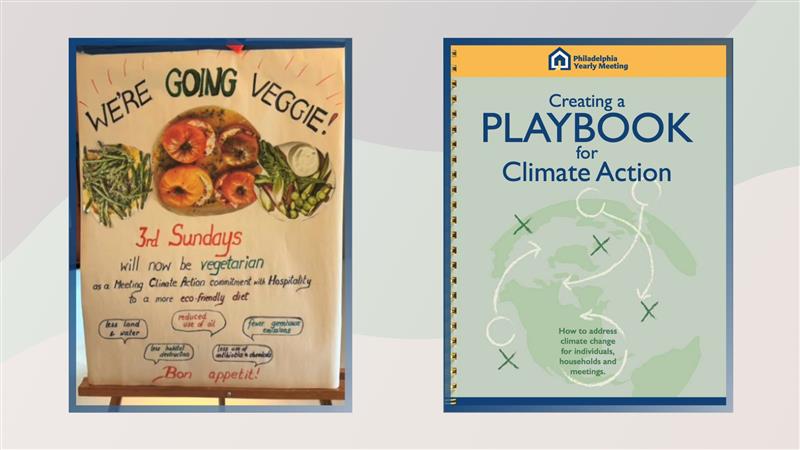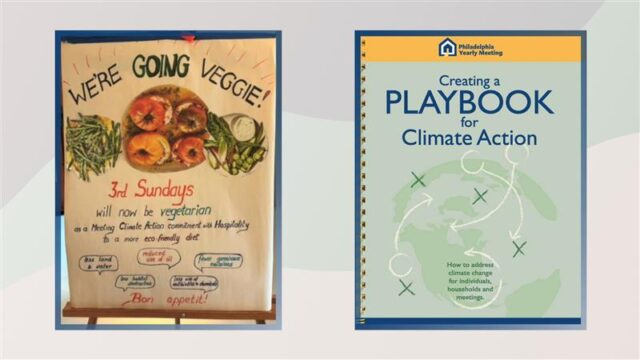

Chestnut Hill Friends Meeting has embraced a new initiative to support climate action by “going veggie” on the third Sunday of each month. This meeting-wide project is the result of collaboration between the Climate Action and Hospitality Committees, reflecting a shared commitment to addressing climate change.
Sarah Whitman, a member of both committees at Chestnut Hill Friends Meeting, shared her perspective and the behind-the-scenes on this new initiative. “Last spring, we started a Climate Action Committee to help the meeting address climate change,” Sarah shared. “There have been individual leadings and practices related to climate change, but not a project that the whole meeting does together. I happen to be a member of both Hospitality and the Climate Action Committee, so I felt like this was an opportunity for synergy between those two committees.”
The decision to go vegetarian aligns with the meeting’s broader climate action goals, guided by the yearly meeting’s resource Creating a Playbook for Climate Action. “The Climate Action Committee is using PYM’s playbook to develop initiatives around climate change,” Sarah explained. “The playbook looks at the areas of activism, education, carbon footprint, finances, and instilling hope. This initiative to go veggie can address several areas, including education—examples of delicious veggie meals, and information about why eating vegetarian is better for the planet; carbon footprint—paying attention to what we buy, for example, less meat; how we shop, for example, organic food; finances—supporting businesses that promote sustainable agriculture; and instilling hope—demonstrating an easy way for individuals to make a difference, and how eating good food together supports community bonding.”
“Within the meeting, we see the work of the Climate Action Committee as long-term,” she said. “This will be an ongoing effort, and we expect it will take time and ongoing energy to do this work. So instead of, for example, one veggie Sunday—one and done—we are looking for ways to make ongoing commitments to addressing climate change.” She added, “We also feel supported knowing that PYM is inviting all meetings to join in this work. We are not alone. PYM also offers online meetings each month for those involved in this work to get together for support, to share what projects they are trying, and to discuss what is and isn’t working in each meetings’ community.”
PYM offers a variety of events regarding climate action. On October 10th, to provide all members and meetings support to act, PYM is hosting a virtual workshop, Using PYM’s Climate Action Resource: Let’s Check In. This is part of the broader goal to empower individuals and groups to make impactful changes and utilize PYM’s resource Creating a Playbook for Climate Action, like Chestnut Hill Friends Meeting.
Sarah hopes that this initiative will encourage broader community action. “There are many ways for individuals and meetings to be environmental stewards,” she reflected. “The PYM playbook helps us keep in mind projects across many areas.”
She also highlighted the spiritual nature of this work. “One central idea for us is that climate action is also a spiritual issue,” she said. “It touches on the Quaker values of equality, stewardship, and integrity. We feel that this work puts our beliefs into action. We also feel supported—and challenged—by our faith to do this work.”
The Hospitality Committee has embraced the shift to vegetarian Sundays with enthusiasm. “Happily, the Hospitality Committee was enthusiastic when I proposed this idea,” Sarah shared. “We have some great cooks on the committee who are already vegetarian, so they were excited to share their knowledge and recipes.”
As the initiative continues, the Chestnut Hill Friends Meeting will focus on educating members about the environmental benefits of a vegetarian diet. “We have just started this initiative in September, so we are still at the ‘providing education and generating excitement’ phase,” Sarah noted. “Over the Fall, we plan to continue to educate our meeting on how this style of eating cares for the environment. As well, we will be providing recipes, having several Friendly 8’s with a vegetarian theme, inviting members to bring in their favorite vegetarian dish for a lunch, teaching how to have a veggie Thanksgiving, etc.”
She concluded by saying, “We want this project to be something we do together as a community, and one that strengthens our meeting.”
Sarah also concluded with something personal, when asked about any recipes she is excited to share this fall during vegetarian Sundays. “This (One-Pot Vegetarian Chili) is one of my favorite meals from my childhood, one that I cook often myself, and one I’ve passed down to my daughter. She actually wrote it up at her work as a food writer on the Today Show!” The recipe is as follows:
One-Pot Vegetarian Chili
Ingredients:
2 tablespoons extra-virgin olive oil
2 medium yellow onions, peeled and roughly diced
1 red bell pepper, diced
1 (15.5-ounce) can black beans
1 (15.5-ounce) can red kidney beans
1 (28-ounce) can diced tomatoes
½ cup raisins
1½ teaspoons chili powder
1½ teaspoons dried parsley
1 teaspoon kosher salt
1 bay leaf
1 teaspoon dried basil
1 teaspoon dried oregano
½ teaspoon garlic powder
1 cup water
8 ounce sharp cheddar cheese, shredded (optional)
8 ounce roasted and unsalted cashews (optional)
8 ounce sour cream (optional)
- In a large pot set over medium-high heat, add oil and warm for 30 seconds. Add the onions and pepper and cook for about 5 minutes, or until slightly soft.
- Add both varieties of beans, tomatoes, raisins, spices and water. Stir to incorporate and bring the mixture to a boil.
- Cover the pot and reduce the heat to maintain a gentle simmer. Cook for 45 minutes to 1 hour, stirring halfway through.
- To serve, scoop the chili into individual bowls and top with cheddar cheese, sour cream and cashews.
Are you or your meeting using Creating a Playbook for Climate Action? Let us know how by contacting us at communications@pym.org.